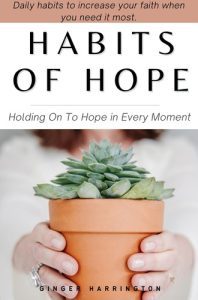Habits of hope increase our trust in God’s faithfulness. Discover six practical ways to increase your trust in God’s faithfulness on your good days as well as your hard times. Practice these habits to hold on to hope as you recognize and rely on the faithfulness of God in your life. Ready to get started?

The Online Wiley Library defines Biblical hope as “the confident expectation of what God has promised and its strength is in His faithfulness.” Knowing and experiencing God’s faithfulness strengthens our faith to hold onto hope even in the worst moments of life. Cultivating habits of hope equips us to trust in God’s faithfulness when we need it most.
One of those moments blindsided me when my sister was diagnosed with ALS (also known as Lou Gehrig’s Disease). My heart broke at the terrible news of this terminal diagnosis that would gradually rob her of all ability to move and even breathe. Questions and fears spiraled in my head, making it hard to catch my breath at times.
- How could this be?
- Why would God allow this to happen?
- How are we going to make it through?
There were many hard days–we often joked it was like living in a puzzle. As soon as we would find a way to navigate one problem, she would loose more strength, bringing more challenges to overcome. I discovered that habits of faith positioned me to receive God’s strength, hope, and endurance I needed in the hardest season of my life. Having practical ways to trust God strengthened me to be a source of help and hope for my sister as she navigated her final days with courage.
What Does the Bible Say About God’s Faithfulness?
The Bible has much to say about God’s faithfulness. On verse that stands out to me is Psalm 33:4:
“The Word of the Lord is faithful and true;
He is faithful in all He does.”
A key attribute of God’s character, his faithfulness provides a firm foundation for our faith and hope. Because God is trustworthy, we can expect to experience his faithfulness in our life.
But it doesn’t always feel like God is faithful.
Have you experienced this tension between faith and experience? Between knowing facts that God is faithful and recognizing through your experience that God is faithful? Habits of hope bridge the gap when we wait for God in our hard places. This feeling of dissonance is part of every person’s journey of spiritual growth. Believe it or not, it can be a way God increases your faith and shows you his goodness.
Experiencing God’s Faithfulness in Hard Times
In the Bible, there are various words for the concept of knowing. One of them is ginosko. We can find this word in John 8:32 where Jesus says, “You will know the truth, and the truth will set you free.” In this verse he is talking about far more than knowing truth on a factual level. Ginosko is knowledge that goes beyond information and often is related to intimate knowledge built through relationship.
Caring for my sister as her health and mobility declined, put us in daily situations we had to depend on God. I found that spiritual habits helped guide my thinking during this emotional time.
The power of habit can increase our trust in God’s faithfulness. Share on X
Each time we recognize and respond to God’s faithfulness in our life, we have the opportunity to grow in faith.

God wants to build an intimate relationship with each of us. One where we know him more deeply as we experience his faithfulness and love in the midst of our problems.
Please understand that I’m not speaking from theory or giving platitudes to feel better. Nobody has time for that. We deeply benefit from practical habits and mindsets that empower us to rely on the goodness of our faithful God in every circumstance. God used these practices to minister to my heart even in the darkest moments of caring for a loved one dying from ALS. I hope they will help you build a foundation of experiencing God’s faithfulness in your life as well.
Six Habits of Hope to Increase Your Trust in God’s Faithfulness
1. Look for God’s faithfulness.
Consider how often we miss ordinary moments of God’s daily blessings in our lives due to not paying attention. Lamentations 3:23-24 tell us about God’s faithfulness:
The Lord’s lovingkindnesses indeed never cease,
For His compassions never fail.
They are new every morning;
Great is Your faithfulness. (Lamentations 3:22-23 NASB)
Take a moment to reflect on the truths of God’s faithfulness in this passage. Unceasing love, kindness, and mercy, as well as compassion that will not fail. I love that these gifts of grace are fresh every morning. This means, you can’t ever use them up, run out, or fall short. God will always be faithful.
Because God’s word tells us he is faithful we can look for his faithfulness with active faith. Expectation, hope, and waiting are all powerful acts of trust in the faithfulness of God.
This isn’t expectation that demands God prove his faithfulness to us. But rather, it is anticipation built on trusting God’s Word.
Consider how your faith will increase when you note daily examples of God’s goodness, whether big or small. Here are a few ideas to get started:
- Keep a list of answered prayers.
- Write down daily blessings of God’s faithfulness.
- Note “God Moments” in a journal, notebook, or margin of your Bible.
- The Daily Examen includes a practice of noticing moments you felt connected to God the end of the day.
When watching for God’s faithfulness becomes a daily mindset, you will notice many ways God is active in your life. The more you recognize his faithfulness, the more your faith will increase. Nurturing your faith today, will prepare you to trust God more fully when you experience difficult times.
2. View God’s faithfulness as a fact, not a question.
Faith requires we trust in God even when we don’t see tangible evidence of his faithfulness. It’s tempting to want proof of God’s faithfulness before we trust him. We want to see it, then believe it. This mentality views God’s faithfulness as a question for debate rather than a fact of his nature.
Habits of hope equip us hold fast to the Word of God, especially when life is hard. Meditating on the truths of God’s character helps bring our expectations and prayers into greater alignment with God’s nature.

Remembering the truth of God’s faithfulness can also protect us in spiritual warfare. The enemy often plants suspicious thoughts in our minds, stirring up doubts about God’s trustworthiness. When the truth of God’s faithfulness is debatable, we play into the enemy’s hands, leaving us with shaky faith.
- What if . . . we stop having that debate in our minds?
- What if . . . we don’t give the enemy an opportunity to create doubt?
- What if . . . we embrace the truth that God is faithful and begin to see our challenges from that perspective?
Our circumstances do not define God’s faithfulness. God is faithful IN your challenge. Share on X
When you catch yourself feeding fear with “what if” questions, change your answer. Tell yourself the truth– a very practical way to stand firm in the truth God’s faithfulness, especially in difficult times.
- What if things don’t work out? GOD is faithful.
- What if make a mistake? God IS faithful.
- What if I fail? God is FAITHFUL.
You catch my drift, right? Don’t think I’ve got this down. I can worry with the best of folks, but I’ve learned the importance of remembering God’s faithfulness as a habit of hope.
3. Draw near God rather than let doubt drive you away.
Don’t let doubt or disappointment drive you away from God. What if you change the pattern of doubtful questioning by seeing difficult moments as a signal to turn to God. Share your fears and emotions. Invite Jesus into your thoughts and emotions, seeking his comfort and guidance. Use the following questions or prayers to lean into God:
- “Lord, show me how to pray right now.”
- “Lord, open my eyes to your faithfulness today.”
- “Lord, what do you want to show me about yourself in this challenge?”
- “Lord, what do you want me to understand about myself or this problem?”
- “Lord, thank you that you are with me. Comfort me with your Spirit.”
- “Lord, I entrust my hopes and emotions to you. Show me how to navigate this hard time.”
Even when you don’t understand his plan, believe in his faithfulness, and trust his heart. Hold onto hope and don’t let go. God often reminds me of this quote from Charles Spurgeon when I have questions and confusion in tough situations.
“God is too good to be unkind and He is too wise to be mistaken. And when we cannot trace His hand, we must trust His heart.”—Charles Spurgeon
Our struggles are meant to take us deeper with the Lord, not drive us away from our faith for God.

4. Experience emotions but don’t let them rob you of hope.
Our emotions play a huge role in whether we truly believe God is faithful.
When we struggle to find emotional equilibrium in stress, loss, or uncertainty, focus on the reality of God’s faithfulness and truth. It’s easy to feel disconnected from God’s presence when we feel sad, lonely, heartbroken, or angry.
Have you ever said something like this: “I just don’t feel like God is with me right now”?
Feelings carry messages about what we believe in the moment. They reveal what we think about our situation, other people, ourselves, or even God’s faithfulness.
As we learn to recognize and process our emotions with God, faith increases as we embrace what is true. We often miss these verses that sandwich the familiar Lamentations 3:23-24:
“So I say, “My strength has perished,
And so has my hope from the Lord. . .This I recall to my mind,
Therefore I have hope.The Lord’s lovingkindnesses indeed never cease,
For His compassions never fail.
They are new every morning;
Great is Your faithfulness.The Lord is my portion,” says my soul,
“Therefore I have hope in Him.” (Lamentations 3:18, 21, 22-24 NASB)
Jeremiah practices a powerful habit of hope by affirming God’s faithfulness in the midst of discouragement, depression, and despair. Even when it doesn’t feel true, speak the truth to your soul: God’s compassion and grace is new for you every morning. He is faithful.
5. Make an intentional choice to trust God with hope.
And how do we do that? One moment at a time.
This has been a theme that has brought freedom from anxiety and worry in my life. So much so, God gave me the opportunity to write a book about it!
Holy moments happen when we choose to believe God is faithful, rather than default to fear, stress, or doubt. When we’re faced with problems, the present moment is the time to rely on God‘s faithfulness.

We can’t re-write yesterday’s experience or schedule tomorrow’s intention to trust in God. The more we practice the holy habit of choosing faith in the moment, the more we see the reality of God’s faithfulness in our story.
If your faith doesn’t feel strong enough to slay giants like David, ask God for faith to pick up the stone and put it in your slingshot. Rely on his provision for faith you need to take your next step. Trust him with now—how life is and how you are.
6. Respond to God’s faithfulness with gratitude.
Cultivate a daily habit of gratitude and worship to nurture hope. I wonder how many prayers God has faithfully answered that I didn’t notice or didn’t thank him for. Can you relate? Remember the story of Jesus healing ten men whose lives were destroyed by leprosy (Luke 17:11-19)? How convicting that only one returned to express his gratitude!
As we cultivate a thankful heart, gratitude helps us to notice the big and the small ways that God is faithful in our lives. Gratitude trains us to see God at work around us. Daily gratitude helps us to be faithful in the small things. As Jesus said, “One who is faithful in a very little is also faithful in much” (Luke 16:10 ESV).
Isn’t it interesting that in God’s faithfulness, he helps us learn to be faithful as well? Gratitude opens our hearts to the work of God around us. I’ll be honest, there are times when this is hard to do. Embracing God’s faithfulness makes us deeply thankful that we are not alone in our struggles.
- When you don’t have the answers, thank God because he’s faithful.
- When your heart feels like it might drop out of your body, thank God because he’s with you.
- When the darkness feels overwhelming, thank God for his light.
- When you wonder if you’ll ever feel happy again, thank God with your tears because he’s collecting every single one of them.
- When you worry that you could never make up for your actions, thank him because you are already forgiven.
Trusting in God’s faithfulness is a dynamic journey of daily choices that create habits of hope. Some days will go better than others so it’s important to trust God with the process. Today is not the end of the story.

Habits of hope pave the way from knowing the fact of God’s faithfulness to a deep, relational knowing through our experience. Begin to practice these daily habits of hope to help you recognize and rely on God’s faithfulness. Start now to build habits of hope in your life. They will bless you on your good days and increase your faith on your hardest days. These habits of hope were game-changers for me both during my sister’s illness and in grieving her passing.
Which one of these faith-building practices do you most need in your life right now? What habit of hope helps you hold trust in God’s faithfulness when you experience hard times? Leave a comment and share a hope builder in your life.
A Free Resource Just for You
Meet your new favorite resource to cultivate habits of hope in your life. Nurture your soul today for stronger faith when you need it most. Available as a free resource for a limited time!
The Daily Examen
With roots in the Catholic contemplative tradition, The Daily Examen is a helpful way to reflect on your day and grow in intimacy with God. There is also a phone app that provides prompts to help you connect with God’s faithfulness with the Daily Examen. You can explore the phone app here.
Related Posts
- Why Positive Thinking is Good for a Healthy Body, Soul, and Spirit
- Why You Should Stop Discounting Your Anxiety
- Are Your Feelings Defining Your Faith
- 10 Free Resources for an Emotionally Health You
- 20 Toxic Ways of Thinking That Will Poison Your Life
- 3 Reasons Why You Should Let Go of Negative Thinking
- Strategies and Scriptures to Combat Negative Thinking: With Free E-book


 So glad you're here. I help busy women—gals like you— build healthy habits for living well with biblical wisdom and practical steps to deepen your faith, increase your hope, and thrive in your purpose.
So glad you're here. I help busy women—gals like you— build healthy habits for living well with biblical wisdom and practical steps to deepen your faith, increase your hope, and thrive in your purpose.




“Gratitude is good for your soul” is one of my favorites from your post. Thanks for all these practical reminders to keep us grounded and hopeful!
Hey there–so glad you love this quote! It’s right up your alley for sure. With all that’s going on in the world, we need reminders to focus on the eternal in the midst of challenges. Hope makes such a difference when we keep our eyes on Jesus!
ALS is a cruel disease. My mum is 83 and had great difficulty speaking and swallowing much of anything. Food was getting trapped in her throat and blocking her air way was happening more often. she battled for each breath. The riluzole did very little to help her. The medical team did even less. Her decline was rapid and devastating. The psychological support from the medical centre was non-existent and if it were not for the sensitive care and attention of our primary physician, there she would have died. There has been little if any progress in finding a cure or reliable treatment. Acupuncture eased her anxiety a bit. this year our primary physician started her on Natural Herbs Centre ALS/MND Ayurvedic treatment, 6 months into treatment she improved dramatically. It has been a complete turnaround with her speech, she no longer needs the feeding tube to feed, the treatment is a miracle. She recovered significantly!
Katherine, thank you for sharing your experience with this terrible disease. It is brutal for both the one ill and for those who love and care for them. The treatment options are very limited. I’m so thankful your mom has responded well to her treatment. What a blessing! I know you are all thrilled!